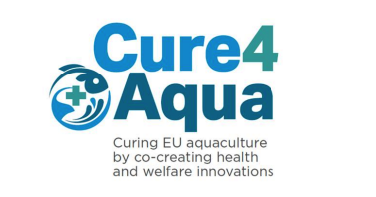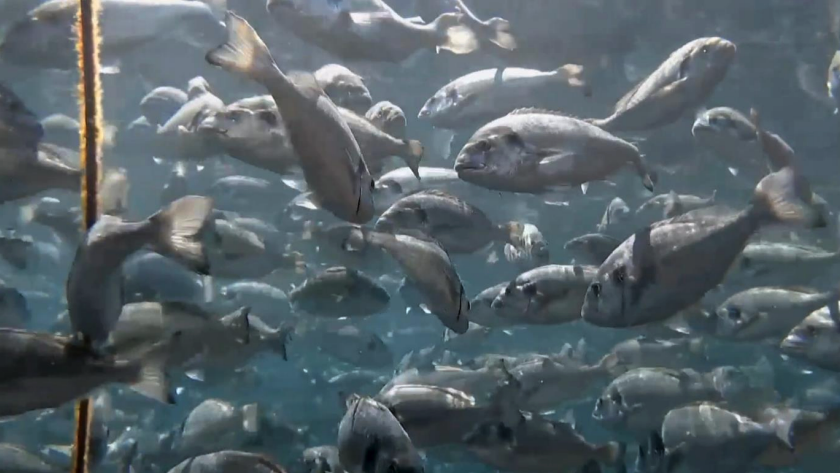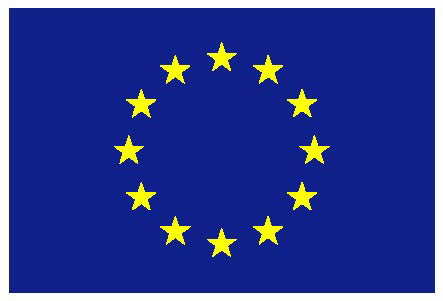
New Horizon Europe project launched to enhance the resilience of EU aquaculture by improving aquatic animal health and welfare.
Researchers from 16 countries are uniting to transform aquatic animal health and welfare within the European aquaculture industry, while also supporting the environmentally friendly, inclusive, safe and healthy production of seafood.
Funded by the EU Horizon Europe programme, Cure4Aqua is a €4.8 million, 4.5-year project that will develop new approaches to prevent aquatic fish diseases through innovative prophylaxis and technologies for early disease detection, while also supporting the advancement of alternative treatments to replace pharmaceuticals in disease control.
Farmed seafood is an important source of protein for food and animal feed, with a low-carbon footprint, essential to help build a sustainable food system. However, the control of pathogens continues to be a major challenge for the sector. This is particularly relevant for Europe, where there is a great variety of species and production systems, which hinders the implementation of good husbandry practices tailored to each aquatic species.
Cure4Aqua has brought together leading experts to take several key actions:
– Develop cost-effective vaccines to prevent diseases in farmed fish
– Implement selective breeding programmes to improve stress and disease management
– Develop innovative, bio-based and sustainable alternatives to antibiotics for controlling fish diseases at various life stages
– Develop new tools and artificial-intelligence-based technology to improve fish health and welfare
– Improve diagnostics of fish pathogens
– Integrate farmer and fish welfare as a priority of aquaculture production by developing high welfare standards that consider different life-stages, production systems, and knowledge of welfare needs.
Cure4Aqua project coordinator, Ivona Mladineo from the Institute of Parasitology (BCAS) in Czech Republic said:
“Research must be at the forefront of positive changes that will ensue our food systems are sustainable while caring about high health and welfare standards for fish. There is an urgent need to solve some of the major shortcomings and constraints that the European aquaculture industry is facing. Cure4Aqua will address these issues by building a co-creative approach with other players interested and involved in the aquaculture. I am looking forward leading this vital project.”
Cure4Aqua partners held an inaugural project meeting on 16-17 November 2022 in Prague (Czech Republic).
The project will run until April 2027. For more information, please visit cure4aqua-project.eu or follow @Cure4Aqua_EU

Figure 1 Gilthead seabream (Sparus aurata) – one of the targeted species in the project. Credit: AquaTech Lab, HCMR
Notes for Editors
About Cure4Aqua
• Project overview on the EC research portal: https://cordis.europa.eu/project/id/101084204
• Project website (coming soon): cure4aqua-project.eu
• Follow us on Twitter: @Cure4Aqua_EU
Contact
• Project Coordinator: Ivona Mladineo (ivona.mladineo@paru.cas.cz)
• Project Communications: Matteo Capodicasa (matteo@erinn.eu)
Cure4Aqua Partners
• Biologicke centrum AV CR, v.v.i. (BCAS) (Czech Republic)
• Thalassa Limited (UK) • RODGER HAMISH, Vet-Aqua International (VAI) (Ireland)
• MOREDUN RESEARCH INSTITUTE (UK)
• ERINN Innovation (Ireland)
• HELLENIC CENTRE FOR MARINE RESEARCH (Greece)
• DANMARKS TEKNISKE UNIVERSITET (Denmark)
• KOBENHAVNS UNIVERSITET (Denmark)
• NOVAPTECH (France)
• THE UNIVERSITY COURT OF THE UNIVERSITY OF ABERDEEN (UK)
• PANEPISTIMIO KRITIS (Greece)
• UNIVERSIDAD DE SANTIAGO DE COMPOSTELA (Spain)
• SVEUCILISTE U SPLITU MEDICINSKI FAKULTET (Croatia)
• INSTITUTO POLITECNICO DE LEIRIA (Portugal)
• AQUATIC BIOLOGICALS PRIVATE COMPANY (Greece)
• NORD UNIVERSITET (Norway)
• SWANSEA UNIVERSITY (UK)
• UNIVERSIDAD AUTONOMA DE BARCELONA (Spain)
• STIFTUNG TIERAERZTLICHE HOCHSCHULE HANNOVER (Germany)
• AGENCIA ESTATAL CONSEJO SUPERIOR DE INVESTIGACIONES CIENTIFICAS (Spain)
• Faculty of Veterinary Science, Chulalongkorn University (Thailand)
• GALAXIDI MARINE FARM AE (Greece)
• BIOCEANOR (France)
• IMPERIAL COLLEGE OF SCIENCE TECHNOLOGY AND MEDICINE (UK)
• Prorata S.A. (Greece)
• Wylegarnia Ryb Dabie, Krzysztof Grecki i Jacek Juchniewicz (Poland)
• VETERINAERMEDIZINISCHE UNIVERSITAET WIEN (Austria)
• EIDGENOESSISCHE TECHNISCHE HOCHSCHULE ZUERICH (Switzerland)
• TissueLabs Sagl (Switzerland)
• Pathovet AG (Switzerland)
• PONTIFICIA UNIVERSIDAD CATOLICA DE VALPARAISO (Chile)
 Funded Funded by the European Union under the Horizon Europe Programme, Grant Agreement No. 101084204 (Cure4Aqua). Views and opinions expressed are however those of the author(s) only and do not necessarily reflect those of the European Union or European Research Executive Agency (REA). Neither the European Union nor the granting authority can be held responsible for them.
Funded Funded by the European Union under the Horizon Europe Programme, Grant Agreement No. 101084204 (Cure4Aqua). Views and opinions expressed are however those of the author(s) only and do not necessarily reflect those of the European Union or European Research Executive Agency (REA). Neither the European Union nor the granting authority can be held responsible for them.




